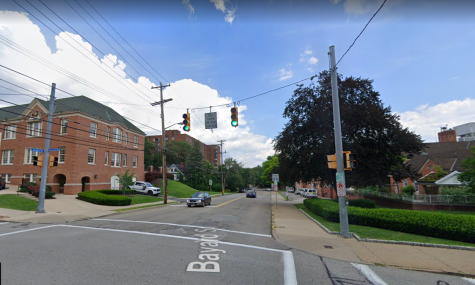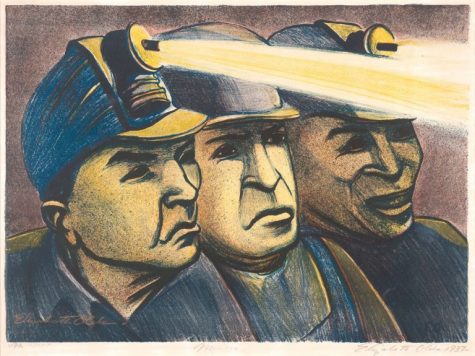The BIG COOKIE Addiction

Image sourced from epicurious
Opioids have been a sweeping devastation across the world for centuries, and across America for decades. It may seem as though you can never move away from the scent of a cigarette in downtown Pittsburgh, and away from cotton-candy scented vapor in Oakland. This is not a revelation of any sorts, as it’s something we have all been experiencing from some sort of perspective for several years. We see it on the streets, we see it in the news, and addiction does not stop at anything, as we see it even inside our very own schools. The addiction most prominent of course is that to polyChocolateFlouricGlucose, or, the Big Cookie.
Dr. Lynn Horton, teacher of Chemistry and AP Psychology, begins to pace upstairs while waiting for her daughter to bring her weekly Big Cookie. After a long week the minutes tickingpast feel like centuries as her strides quicken, in a futile attempt to console her brain’s deprivation. Each week she works diligently, and come Friday welcomes the reward of a Big Cookie as a reminder that she can now have a weekend, and must only get through a few more hours at school. Expressing her feelings to her AP Psychology class, she said she wasn’t sure what to do the following year, as her daughter would be in college and no longer able to bring her a Big Cookie, which has become so intricately woven into her Friday expectations. Without the Cookie, she knows she would become restless, pacing and yelling at Seniors (not only Sophomores and Freshman), cranky, and let kids out for lunch at 12:45, instead of the designated 12:40. Without the Cookie, a Friday would not feel right to her, and the comfort that it brings would be lost to the wind, instead bringing frightened souls of children and adults alike. These reactions are best characterized as withdrawal, which stems from the epidemic: addiction.
Addiction is characterized by compulsive behaviors to preform an action, in order to receive a “reward”. These reward-seeking behaviors have been displayed in both humans and rats. Taking place in the Limbic System, which is responsible for all of your emotional and behavioral responses, addiction taps into your “feel good” hormones and the brain uses their response to remember a behavior, to then seek that same behavior once again. In terms of the habit-forming debate, the “feel good” hormone we all know to be Dopamine, sits front and center. The hormone is called in when a brain likes the emotional response of a behavior, so the brain can remember the behavior and the affect it has on both your body and brain. Dopamine lets your brain remember how good it feels to have melted chocolate and dough bouncing across your tastebuds and once the memory is formed, your brain will go out of its way to find that which created the memory to replicate the feeling, and thus, a new desire has formed. Experts are certainly understanding of those desires for unhealthy foods especially, as it has been shown that foods with a high calorie count, and amount of sugar and fats, are responded to with the reward center. Our brains hog the majority of our energy intake, so if we eat more foods with higher calorie counts, more calories are available to go to our brains, and can also be distributed to our bodies. It has also been seen that eating foods such as these actually can trigger our touch centers, creating the same effect in our brain that a hug from someone such as our mothers would. This means that all the food you eat when you’re stressed is literally comfort food, and by eating unhealthy foods you are replacing the desire for human contact and comfort. (This isn’t a call out though, I’ve finished an entire box of hot chocolate trying to make my deadlines, and it’s not yet the end of the week.)
Due to the collective desire from Dopamine, and the craving for comfort, we see addiction sweep the floor with students and teachers alike, the students anxious to turn papers in, and teachers to grade what they had assigned. As they reach the last day of the week, between studying and making lesson plans, between the adrenaline rush of running down to grab a cookie as Community Time begins, and the release from the actual cookie, addiction festers within the precious and precocious minds at WT.
One Student, among many of his peers, has displayed notable symptoms. Alessandro Memoli, 11th Grade, was spotted on a Friday, power walking into the cafe downstairs, distraught and boasting an expression

of pure fear on his face, muttering “please, please, please” while craning for a look towards the bins which hold the Big Cookies. The boy, only 16, is a part of the group which buys two cookies each Friday, searching desperately for the “high” the Big Cookies deliver.
Survey results from the students show that almost 80% of students regularly buy Big Cookies from the downstairs cafe, and many of them report buying them because they want to feel “warm”, and one student reported feeling “Happy” after eating a Big Cookie -which is cause for concern due to the overwhelming amount of data showing that students are rarely, if ever, “Happy”. The survey also shows that the addiction is a spectrum across the student body, as some report the Cookie as a sort of guilty pleasure, some report happiness and warmth, and some have openly talked about feeling like they would not be able to make it through a given Friday should they be deprived. Alessandro and his friends might be described to be quite far along the spectrum.
As he watches over his meager students and decrepit fellow faculty members, observing as the addiction flows through their veins, disappointment clouds his eyes. Proudly abstinent, Joel Hammer, teacher of several different subjects that I don’t care enough to compile, has shared his opinion of the Big Cookies and how he has seen them devastate the community. “I’ve watched as students have fought over the last cookie, and slowly depleted their school accounts by buying them” he said to me in an interview, “It’s a tragic thing which has yet to be dealt with.” Following the epidemic closely his past two years, he has watched the school on its steady decline towards a lack of free will. “It’s almost as if the Metz staff are scientists, and they watch as the students and teachers become rats, mindlessly participating in one large experiment.” As we concluded the interview he left me with wise words, directed towards the
entirety of his students and peers, “Stay in school, stay off big cookies.”







Margaret Balich • Dec 20, 2018 at 8:09 pm
Fantastic article. 10/10, would read again.